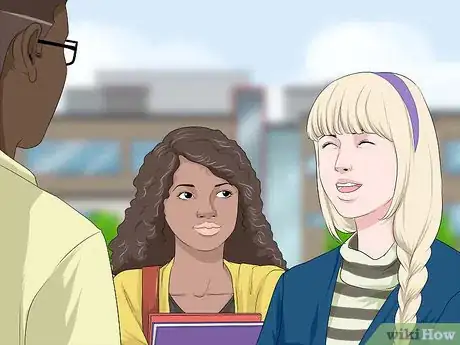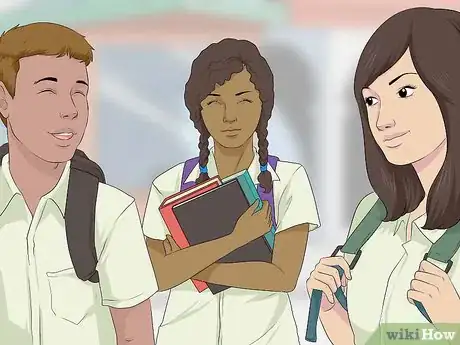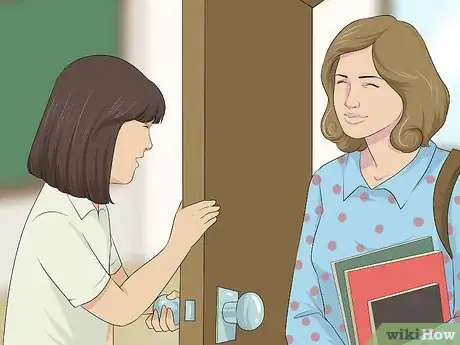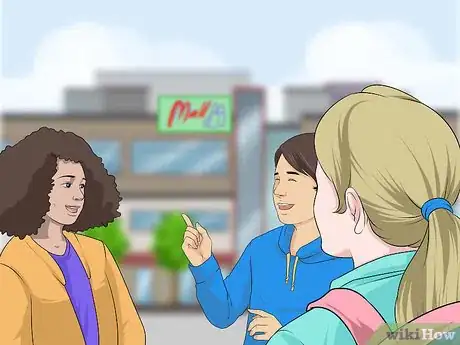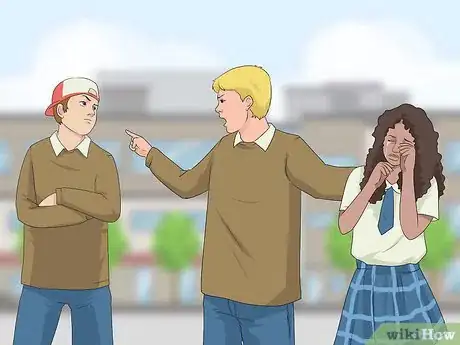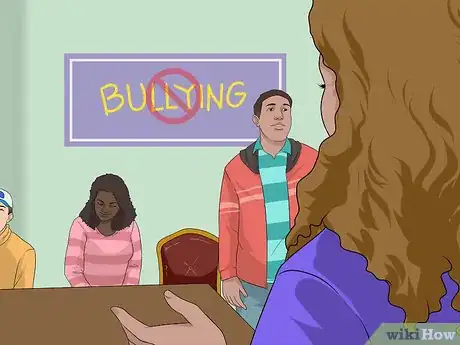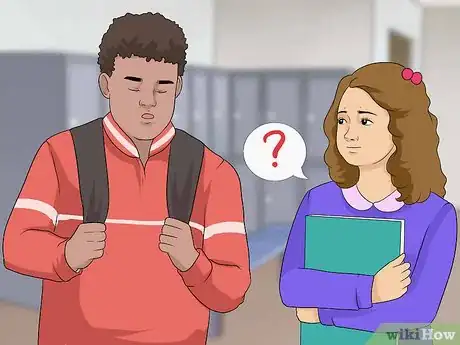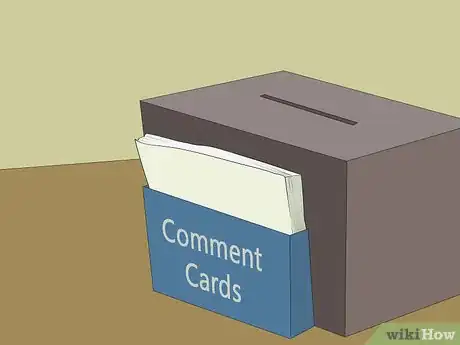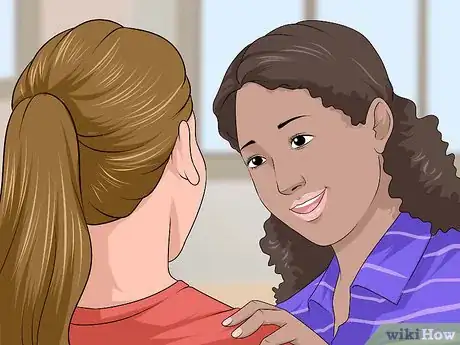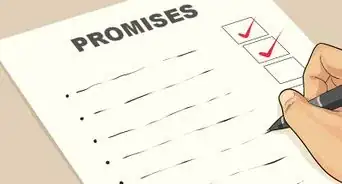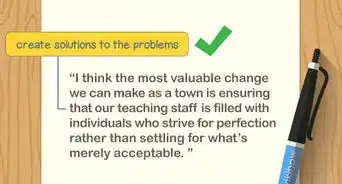This article was co-authored by Ashley Pritchard, MA. Ashley Pritchard is an Academic and School Counselor at Delaware Valley Regional High School in Frenchtown, New Jersey. Ashley has over 3 years of high school, college, and career counseling experience. She has an MA in School Counseling with a specialization in Mental Health from Caldwell University and is certified as an Independent Education Consultant through the University of California, Irvine.
wikiHow marks an article as reader-approved once it receives enough positive feedback. In this case, several readers have written to tell us that this article was helpful to them, earning it our reader-approved status.
This article has been viewed 158,411 times.
Congratulations on winning the Class President position! Now you may be wondering, 'what do I do next?' The answer is simple: start the process of striving to be the best class president your fellow classmates have ever witnessed. A good class president embodies characteristics such as kindness, initiative, leadership, and camaraderie. Developing these characteristics and wanting school to be fun for everyone will set you apart from any other class president.
Steps
Treating Everyone Nicely
-
1Practice good manners. Whether it is your best friend, your classmate, a teacher, a janitor, or any other school worker, everyone should be treated nicely. Because you are the class president, you have to set an example on how to interact with people so that everyone else will do the same.[1]
- Let others speak before you speak. Interrupting someone when they haven't finished their thought is extremely rude and shows disrespect to the other person. If it happens by accident, apologize for the incident and let them continue so they can finish what they were saying.
- Stop what you're doing and acknowledge whoever addresses you right away. Don't keep people waiting to try to get your attention, address them quickly so they can see that you want to listen to what they have to say. If you wait too long to address them, they might think you don't have time to listen to them.
-
2Be equally as nice to those that might not be as nice to you. This might sound difficult to do because your instinct might be to be mean back. You are showing great maturity and setting an example to anyone that sees you interact in a positive manner even if you struggle to do it.Respond politely even if someone talks to you in a rude tone. Sometimes people have a bad day or might not be feeling well. Others many not know how to talk to people. As the saying goes, “Kill them with kindness” and be extra nice to them. That can help change their attitude in some situations.Treat everyone you talk to exactly how you want to be treated. That's something that everyone should be doing, but as a leader, this is important for you. Your classmates want to make sure you are listening to what they have to say, so pay attention. Even if what they are saying is not interesting to you, just smile and ask questions to stay engaged in the conversation.Advertisement
-
3Use positive body language to help you communicate better. When interacting with your fellow classmates, positive body language can help you show that you care without having to verbally say it. There are several simple actions that you can do in different situations.
- Make eye contact when speaking to others. Whether it is at the podium during a speech, or when you are having a conversation by the lockers, eye contact is important. It establishes a connection of understanding between people as well as emphasizes what is being said.
- Smile genuinely when greeting others or when having a casual conversation. A smile sets a relaxed tone and will make people feel at ease around you.
- Walk with purpose when getting from one place to another. Don't slouch and walk with your back straight. By doing this you are showing that you take your responsibilities as class president seriously and that you are ready to take on any challenge that arises.
-
4Demonstrate small acts of kindness. It is as important as being respectful. Showing kindness does not have to be anything extravagant. Even the smallest gesture of kindness makes a difference.
- Greet people when you pass by them in the hallways. Saying 'Good Morning' or 'Good Afternoon' is a great way to establish a positive connection with people. Greetings can also really make a difference in people's days if they are not going too well.
- Open the door for others when there are people walking behind you.This small gesture shows good manners and is very appreciated.
- Help students carry their belongings if they have too much stuff on their hands. By doing this you are preventing any possible disaster of students tripping, papers falling everywhere, or projects breaking.
- Show appreciation to cafeteria workers by saying 'thank you'. It is so easy to forget to do this when you're busy talking to your friends, but doing this is important so everyone else can say it as well.
-
5Plan specific days to show gratitude. School faculty, staff, and volunteers do a lot for students. Unfortunately, more often than not, their effort is not appreciated enough. Take the initiative to show appreciation through different activities where many students can get involved.
- Get students to assist you in writing thank you letters to all faculty and staff. Writing thank you letters is a great way to involve a lot of your classmates and teachers will appreciate getting unique letters from different students.
- Help organize a potluck for faculty and staff where the students brings all the food. A potluck can be a great bonding experience between teachers and students.
- Pick a day to have sweets and treats delivered to teachers in their classrooms. Designating students to deliver sweets such as cookies or chocolate to teachers after a long day of lessons is sure to bring a smile to these hard working instructors.
-
6Appreciate your parents too. Everyone's parents do so much to get them to school prepared and ready to learn. There are several ways that you can help students show gratitude to their parents for everything they do for their children.
- Set up a station during lunch time with arts and crafts for students to use in order to create unique letters to give to their parents when they get home. Doing this will help students get creative and will allow them to have fun while showing gratitude.
- Suggest to the music department that creating a song specifically for saying thank you to your parents would be a good idea. The song could be showcased by the student choir, during a talent showcase, or individual students could learn it and sing it to their parents in the comfort of their home.
Getting to Know Your Classmates
-
1Talk to all of your classmates at least once. Depending on your school and class size, this could prove to be a difficult task. But meeting as many people that you are representing as class president is important! Spend your time wisely during the day so you can meet different people during different activities.[2]
- Start up a conversation with someone between classes. Even if you just stop by someone's locker to ask how their day is going, it will help students understand that you are a friendly person.
- Sit with someone new each day during lunch time. Look around the cafeteria to see if anyone is sitting alone and join them for lunch. This is your chance to approach students that are loners and get to know what kind of issues they want you to deal with.
- Partner up with different classmates for projects in class. It is easy to stick with your friend for projects, but pairing up with different people can be rewarding because you will get to know them better while working together.
-
2Remember the names of the people you talk to. Making sure you know your classmates on a name basis is essential of a good class president. Students will connect with you better if you honestly know who they are, and you don't just pretend to care.
- Introduce yourself when you see classmates you have not met yet.
- Ask for students' names and repeat it to them to make sure you're saying it right.
- Acknowledge people you've already met on different occasions by addressing them by name.
- Recall parts of past conversations so classmates can see you pay attention to them.
-
3Put together fun events outside of school. The effort that you put in getting to know your classmates in school is as important as getting to know them outside of school. It is easier for classmates to open up to you if you have fun with them away from the classroom.
- Plan gatherings at the mall to shop together. There are so many stores and activities at a mall, so it is the perfect place to interact with your fellow classmates and learn more about them in a casual setting.
- Get together to watch movies at the movie theatre as a large group.There won't be much talking done during the movie, but the discussion after will help everyone get familiar with each other. This will open up the way for more serious dialogue at school in the future.
- Organize a day in the park with everyone to play outdoors. You can play different games or even enjoy a picnic together. The perfect setting for relaxed conversation.
Being the Voice of the People
-
1Help defend students that are being bullied. If you see a student getting bullied or hurt, help them out. As a leader, it is your responsibility to help defend students that cannot defend themselves. There are several ways to handle difficult situations between students.[3]
- Separate the students immediately and ask if everyone is ok. By calming everyone down and diffusing the situation, students will be able to relax and explain what exactly happened.
- Ask a teacher or staff for assistance if the situation is too big to handle on your own. Sometimes having an adult present is the only way that students will behave, so asking for help should always come to mind in difficult situations.
- Encourage students to report any injustices to you or to school officials. If someone tells you about a specific situation, let a school counselor know so they can approach the student professionally.
-
2Plan activities to help end bullying. Students should feel safe in school, and you can do a lot to make your school a better environment for everyone. You have to remember that this isn't a job just for you, but with school faculty as well. [4]
- Suggest to have hall monitors to supervise students between classes. Hall monitors can help make sure that everything is running smoothly while everyone is going to class. In case there is a problem, a hall monitor can address it or let an instructor know about the issue.
- Help post anti-bullying posters around the school. By doing this, students will be aware of how they act and treat each other. Putting reminders for everyone will see can help reduce bullying.
- Come up with workshops or seminars to help students speak up if they are being bullied.
-
3Find out what issues students care about. Knowing what kind of problems your classmates have at school is important, especially students that are shy or do not like to speak up. Many students do not want to openly admit they have problems. It is your job to try and identify these issues.
- Let students know that you are available to talk with them whenever they need to.
- Tell students your locker number so they can leave anonymous notes with the issues that bother them. You will still receive the messages you need to see, but students will be able to avoid the confrontation that they might not want to face.
- Guide students who are actively voicing their issues to help others students voice their own problems as well.
Growing as a Leader
-
1Make your classmates' ideas the priority. You will have ideas of your own that you might want to see in action, but you have to take your classmates' ideas into equal consideration. Take the time to ask people what kind of issues they want you to work on and then try your best to address them.
- Conduct periodic meetings where students can ask you questions or tell you what is important to them.
- Actively seek out suggestions from both students that you interact with daily and others that you don't see often.
- Come up with different ideas to address the issues that students want resolved.
- Seek students' assistance to work with you in helping reach class goals together.
-
2Be open to feedback about your leadership. You won't be doing everything right as class president, and that is ok! But you need to seek constructive criticism so you can understand what you are doing right and what you are doing wrong. Doing this will help you develop into a stronger leader. [5]
- Ask teachers to evaluate your leading method to see if there is anything you need to change.
- Hand out “comments” cards to students so they can let you know what area you need to improve on as their class leader.
- Create a “pros and cons” with fellow classmates after school for your leadership style.
- Pinpoint your strengths on your own and try to apply that to areas where you believe you need improvement.
-
3Relieve stress easily with the help of others. Not everything will be easy to handle as class president. Some days will be harder than others because things will not go as smooth. Understand that nobody is perfect and that trying your best is what matters the most.
- Take an hour of your day for yourself without having to worry about anything related to your position as class president if there are several issues you are trying to handle.
- Divide the responsibilities you have with the rest of the student council so that you do not have an excessive load of things to do.
- Remember that you can ask for help at any point to make things easier. Your classmates, teachers, and parents are more than willing to assist you in organizing workshops, planning school dances, running fundraisers, or completing any other activity for the benefit of your class.
Expert Q&A
Did you know you can get expert answers for this article?
Unlock expert answers by supporting wikiHow
-
QuestionHow can I be class president if I don't have any friends at school?
 Ashley Pritchard, MAAshley Pritchard is an Academic and School Counselor at Delaware Valley Regional High School in Frenchtown, New Jersey. Ashley has over 3 years of high school, college, and career counseling experience. She has an MA in School Counseling with a specialization in Mental Health from Caldwell University and is certified as an Independent Education Consultant through the University of California, Irvine.
Ashley Pritchard, MAAshley Pritchard is an Academic and School Counselor at Delaware Valley Regional High School in Frenchtown, New Jersey. Ashley has over 3 years of high school, college, and career counseling experience. She has an MA in School Counseling with a specialization in Mental Health from Caldwell University and is certified as an Independent Education Consultant through the University of California, Irvine.
School Counselor
-
QuestionI have to give a speech before campaign week, how do I get more people to like me even though I'm shy? I'm not popular.
 Community AnswerFirst, gather as much confidence as you can. Easy ways to do this are to memorize your speech and act confident. Second, get to know more people before the elections. Third, use ideas that apply to everyone (chess club, sports club, etc.). If you promise one thing another group doesn’t like, it won’t work out.
Community AnswerFirst, gather as much confidence as you can. Easy ways to do this are to memorize your speech and act confident. Second, get to know more people before the elections. Third, use ideas that apply to everyone (chess club, sports club, etc.). If you promise one thing another group doesn’t like, it won’t work out. -
QuestionWhat is the point of a class president?
 Community AnswerYou get to represent your classroom in the student council.
Community AnswerYou get to represent your classroom in the student council.
Warnings
- There will be some situations that you have no control over, just do your best.⧼thumbs_response⧽
- Not everyone is going to like you as class president, so be prepared.⧼thumbs_response⧽
- Don't let being class president get to your head, stay humble!⧼thumbs_response⧽
References
- ↑ Ashley Pritchard, MA. Academic & School Counselor. Expert Interview. 4 November 2019.
- ↑ https://www.snhu.edu/about-us/newsroom/business/qualities-of-a-good-leader
- ↑ https://www.edweek.org/teaching-learning/opinion-response-the-best-ways-to-resolve-conflicts-between-students/2018/02
- ↑ https://www.edutopia.org/blog/successful-school-leadership-social-emotional-learning-maurice-elias
- ↑ https://post.edu/blog/how-to-take-constructive-criticism/
About This Article
Being a good class president is all about getting to know your classmates and representing the things that are important to them. Try to talk to all of your classmates regularly, even if it’s just saying hi and asking how they’re doing. Be nice to them all, so they’ll know they can trust you as class president and as a friend. Before school council meetings, ask kids what issues are important to them around school so you can represent their interests. You should also keep an eye out for bullying and let your teacher know if you see anything so everyone in your class can feel safe. For more tips, including how to be confident when speaking to your classmates, read on!


